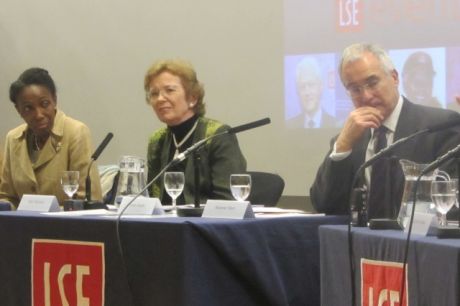Members of the High Level Advisory Committee to the Climate Justice Dialogue (HLAC) joined Lord Nicholas Stern, Chair of the Grantham Research Institute, for a public lecture in the London School of Economics and Political Science (LSE) on 13 March 2014
Members of the High Level Advisory Committee to the Climate Justice Dialogue (HLAC) joined Lord Nicholas Stern, Chair of the Grantham Research Institute, for a public lecture in the London School of Economics and Political Science (LSE) on March 13 which sought to explore who constitutes the innocent, how they are impacted by climate change and how this issue can be overcome.
Chaired by Professor Conor Gearty, the innovative public session brought together a diverse group of like-minded people, who are concerned about the impacts of climate change on the most vulnerable and committed to ensuring that solutions are equitable.
Each participating HLAC member represented a perspective of a group who are vulnerable to the impacts of climate change; some such as future generations represented by Prof Henry Shue, have no responsibility for greenhouse gas emissions while others, such as the private sector, represented by Caio Koch-Weser, Vice Chair of Deutsche Bank, carry some responsibility for greenhouse gas emissions. The public event was organised in collaboration with the LSE and the Grantham Research Institute on Climate Change and the Environment in support of the Declaration on Climate Justice, issued by members of the HLAC in September 2013.
In opening the session, Lord Stern framed the central issue, stating: “we could be much poorer a hundred years from now because of the risk of climate change and it will be the poorest who will be hit hardest.”
Mary Robinson argued that climate change has a negative impact on human rights and that there needs to be a global response that protects and respects the innocent, stating that: “if we don’t do something we are somehow complicit. It is not fair that the most vulnerable are the least responsible. This is an injustice.”
Representing the Small Island Developing States, Dessima Williams, former Permanent Representative of Grenada to the United Nations, suggested that a global response which is “ambitious, scientifically informed and morally driven” is needed. She added: “climate change is a political issue and the world needs to partner to overcome the impacts of climate change. The world is not just a system of states but a society of states.”
Sheela Patel , Chair of Slum Dwellers International, spoke about how the impacts of climate change exacerbate the poverty of her community, the urban poor, but also the opportunities that climate change responses could provide if managed appropriately, particularly in the planning and development of cities. Ms Patel argued that the most vulnerable people are rarely included in decision making processes and argued that information and participation were critical for the development of equitable solutions to climate change: “what role does the urban poor want to play?… We do not want to be seen as victims. We want to be part of the solution. We need information to do this.”
Arguing that many of the answers to climate change will have to come from the private sector, Caio Koch-Weser suggested that the language of climate justice resonates with the private sector in that it requires a long term risk management for society and this relates to future growth and potential.
Speaking about young people, Marvin Nala, Campaigner from Greenpeace East Asia, received a rousing response from the audience when he said: “climate justice is a self-evident concept…it is not just the responsibility of politicians, it is all our responsibility. The burden is heavy but we can spend our lives being part of the solution.”
Prof Henry Shue asked: “Is anyone more vulnerable to the dramatic change than future generations?” Prof Shue argued for formal mechanisms to help us ensure that we considered the effects of every decision on the seventh generation, suggesting that posterity impact statements and the appointment of a public representative dedicated to future generations would begin to ensure that we achieve intergenerational equity.
An audio podcast and video of the public event is available here.
Download
Declaration on Climate Justice


